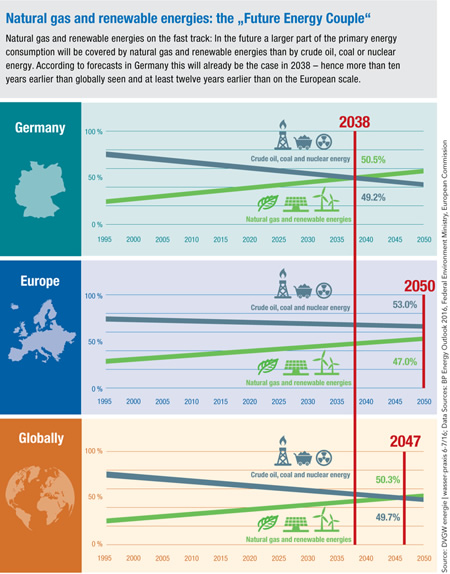Lowering CO2 Emissions With Natural Gas
By Gerald Linke (pictured)
 The Paris UN summit on climate change once again emphatically emphasised that a fast and efficient reduction of CO2 emissions is essential if we want to effectively limit global warming.
The Paris UN summit on climate change once again emphatically emphasised that a fast and efficient reduction of CO2 emissions is essential if we want to effectively limit global warming.
We should consume no more than 565 billion tons of CO2 by the middle of this century. But, how can we achieve this goal in view of a constantly growing population and the general demand for mobility and comfort? Researchers have made huge progress in recent decades, paving the way for innovative technologies designed to increase energy efficiency and the use of wind, solar and renewable energies; while these developments are most promising they cannot, on their own, reduce CO2 emissions to the required level.
Natural gas combined with renewables can, by contrast, provide a basis for a sustainable and efficient energy supply. Being the cleanest of all fossil fuels, natural gas yields the highest amount of energy content per unit of carbon burnt. This is the decisive criterion that we must focus on to achieve the 2-degree climate target. Natural gas has to take a dominant role among the traditional energy carriers in the energy mix if it is to contribute efficiently to global climate protection. For example, when burned, natural gas emits only about half as much CO2 as lignite or black coal, and about one-third less CO2 than crude oil. In other words: Natural gas emits the least CO2 of all existing conventional energy carriers when burned, and thus can help reduce large amounts of CO2 emissions in a very short time.
HIGHLIGHTING THE POTENTIAL OF NATURAL GAS
The most important thing now is to use good arguments to explain that there is no better alternative if we want short-term success in climate protection. After all, natural gas can be used in a wide variety of ways from generating heat and power through to mobility. In Germany, for example, there are millions of out-dated boilers. The replacement by 2020 of 10 million of these boilers by modern natural gas technologies such as, for instance, micro-CHP systems or gas heat pumps would help save 20 million tonnes of CO2 per annum. This measure would be more efficient from both the property owners' and the national economy points of view than the energetic refurbishment of buildings.
 What is more, natural gas is available in abundance, accompanied by an excellent supply infrastructure that permits the storage of surplus energy if sunny and windy days produce more power than the grids can handle. The keyword here is "power-to-gas technology": Electrolysis produces hydrogen and, in a second step, methane from water. Both products can be fed into existing gas lines for interim storage, to be used for the generation of power in gas power plants or CHP systems when needed. More electrolysis systems however need to be installed systematically in order to ensure safe and secure supply with high amounts of clean power. Calculations assume that from 2025 onwards new systems with an output of 500 megawatts and from 2030 onwards new systems with an output of 1,000 megawatts will have to be installed annually to ensure that the minimum number of electrolysis systems required will be available by 2040.
What is more, natural gas is available in abundance, accompanied by an excellent supply infrastructure that permits the storage of surplus energy if sunny and windy days produce more power than the grids can handle. The keyword here is "power-to-gas technology": Electrolysis produces hydrogen and, in a second step, methane from water. Both products can be fed into existing gas lines for interim storage, to be used for the generation of power in gas power plants or CHP systems when needed. More electrolysis systems however need to be installed systematically in order to ensure safe and secure supply with high amounts of clean power. Calculations assume that from 2025 onwards new systems with an output of 500 megawatts and from 2030 onwards new systems with an output of 1,000 megawatts will have to be installed annually to ensure that the minimum number of electrolysis systems required will be available by 2040.
In conclusion, natural gas and renewables contribute greatly to reducing CO2 emissions. Even more, a secure and climate-friendly energy supply, which is affordable for everyone worldwide not just in rich countries – can only be guaranteed with natural gas. And this is why the energy transition in Germany, Europe and everywhere else in the world needs gas
 The future of international energy systems will be discussed intensely at this year's "gat 2016", the leading industry conference of the German gas industry that takes place in Essen this year from 8 through 10 November. Leading representatives of national and international energy suppliers as well as decision-makers from the worlds of politics and business will speak about aspects affecting all countries. English speaking sessions and meetings with simultaneous translation will address such subjects as sector coupling or the use of innovative natural gas technologies. Other
keywords include the phase-out of power generation from fossil fuels, decentralised energy supply, low emission mobility and untapped potentials of the heat market.
The future of international energy systems will be discussed intensely at this year's "gat 2016", the leading industry conference of the German gas industry that takes place in Essen this year from 8 through 10 November. Leading representatives of national and international energy suppliers as well as decision-makers from the worlds of politics and business will speak about aspects affecting all countries. English speaking sessions and meetings with simultaneous translation will address such subjects as sector coupling or the use of innovative natural gas technologies. Other
keywords include the phase-out of power generation from fossil fuels, decentralised energy supply, low emission mobility and untapped potentials of the heat market.
Visit www.gat-kongress.de/english
Contact details:
DVGW Deutscher Verein des Gas- und Wasserfaches e.V. Technisch-wissenschaftlicher Verein (German scientific association for gas and water)
Josef-Wirmer-Straße 1-3, D-53123 Bonn, Germany
Website: www.dvgw.de